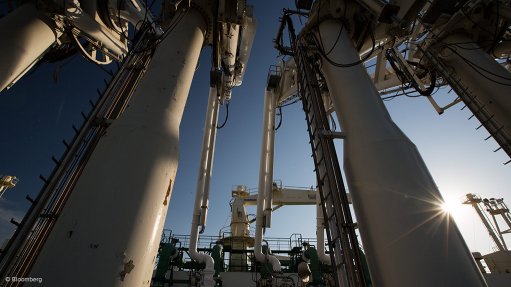
Photo by: Bloomberg
In light of the looming natural gas supply constraints from mid-2026, investment company Reatile Group is actively engaging Sasol on mitigating the gap between 2026 and the eventual arrival of liquid natural gas (LNG) from Reatile’s indirectly-owned import facility.
Reatile, through a 30% stake in Vopak, is part of a consortium that is spearheading the construction of an LNG import facility at the Port of Richards Bay.
The LNG received at the facility will be regasified and fed into the existing Transnet pipeline network through a tie-in pipeline.
The project represents a crucial step towards a more secure and environmentally responsible energy landscape, Reatile states.
“The significance of LNG cannot be overstated in the context of South Africa’s aspirations to diversify its energy mix and combat loadshedding. The transition to LNG not only promises a cleaner and more sustainable energy alternative, but also underscores the nation’s stance towards embracing innovative solutions for its energy needs,” says Reatile chairperson Simphiwe Mehlomakulu.
Elaborating on the discussions that Reatile is having with Sasol, he explains that the companies are exploring possible measures to mitigate a situation of zero supply or reduced supply.
Mehlomakulu warns that these discussions are at an early stage and that no outcome can be confirmed yet.
Meanwhile, some of the imported LNG in Richards Bay will be distributed as regasified natural gas through a pipeline network of Reatile’s subsidiary Egoli Gas.
An existing pipeline to distribute LNG places Egoli Gas at the forefront of enabling this pivotal transition, Mehlomakulu states.
To ensure readiness of LNG deployment, Reatile has appointed Mncedisi Mlilo as COO and acting MD of Egoli. Reatile believes his 30 years’ experience in the gas industry will be pivotal in commercialising the LNG opportunity at hand.
Mehlomakulu concludes that this LNG import project will require collaboration among all stakeholders, including government, the private sector and nonprofits to realise and that a sustainable and secure gas supply can lead to a more prosperous energy future for all South Africans.
BACKGROUND
Engineering News on February 27 reported that large industrial gas users are starting to prepare for what will likely be South Africa’s next big energy crisis – the imminent shortage of natural gas.
Sasol, as the monopoly supplier of large-scale natural gas, in August last year announced that the country was heading for a “gas cliff” in that supply of gas to industrial customers will be suspended by June 2026, following gas flows from the Pande and Temane deposits, in Mozambique, drying up.
Industrial Gas Users Association – Southern Africa (IGUA-SA) in the same article warned that a cessation in the supply of gas, particularly in Gauteng and KwaZulu-Natal, would result in multiple plant closures and a reduction in national manufacturing output.
South African industrial gas users directly employ about 70 000 people and contribute between R300-billion and R500-billion a year to the economy.
As it stands, there would be a 12- to 18-month gap between day zero when Sasol suspends its supply and the finalisation of any feasible replacement supply, according to IGUA-SA.
The departments of Trade, Industry and Competition and Mineral Resources and Energy have since announced that they will lead a task team to assess solutions to the pending gas cliff, while the Gas Master Plan is presented to Cabinet in March.